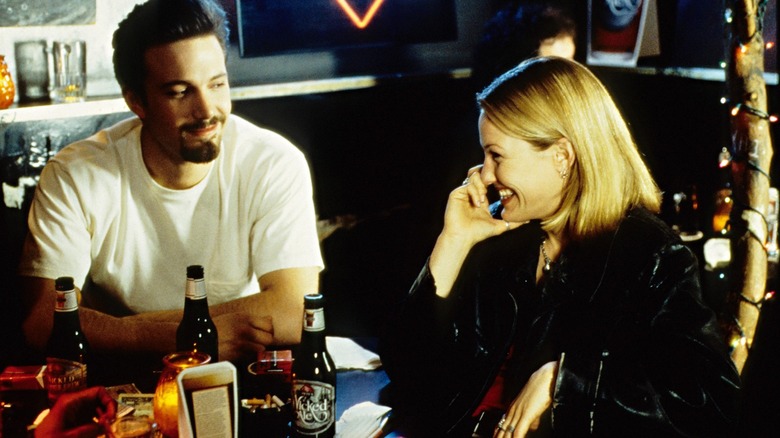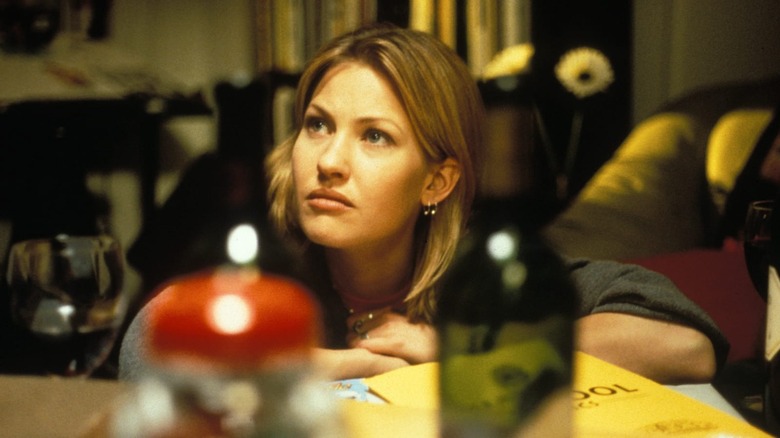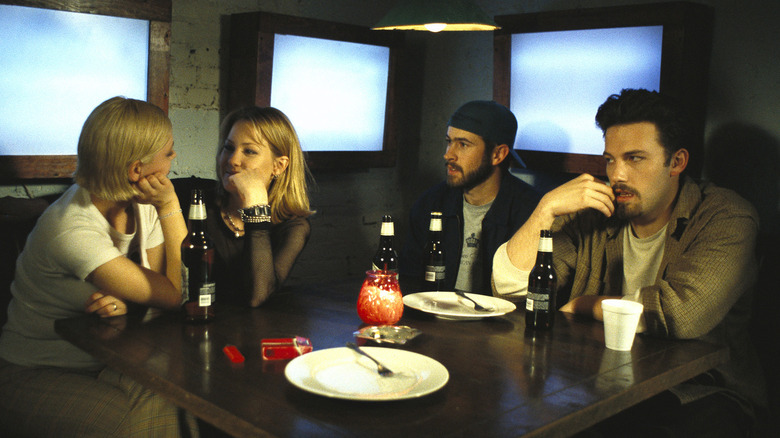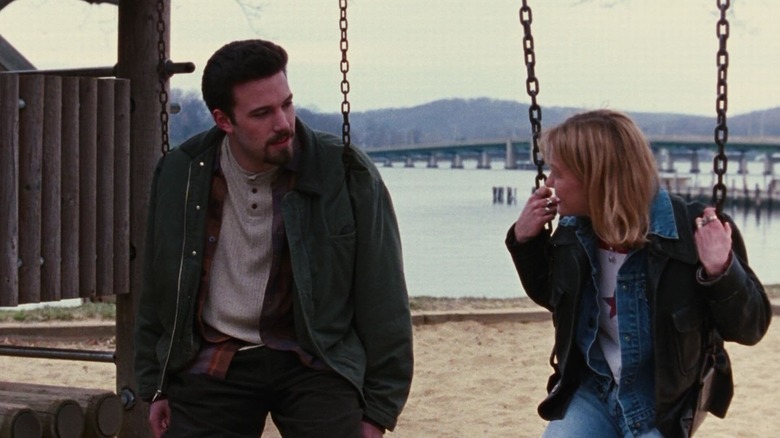Chasing Amy Put Pressure On Ben Affleck Before Filming Even Began
Kevin Smith's 1997 film "Chasing Amy" was considered daring at the time. It was a romantic comedy, but wasn't afraid to delve into a certain kind of sexual and emotional anarchy often produced by the relationships we have in our 20s. It dealt explicitly with male insecurity — openly acknowledged to be foolish — sparked by a woman's sexual agency and history. Some praised its queer themes and sexual frankness. Some appreciated its views on sexual fluidity. Others, even at the time, criticized "Chasing Amy" for catering too strongly to a heterosexual male viewpoint, even going so far as to call it a "twisted take on the male fantasy" of swaying a lesbian to heterosexuality.
Smith based "Chasing Amy" on several personal experiences. A cishet male friend of his, he said, once developed a crush on lesbian actress/filmmaker Guinevere Turner (from the lesbian classics "Go Fish" and "The Watermelon Woman"), whom Smith shared script pages with during writing the writing of "Amy." Additionally, Smith's own brother had also recently come out, and Smith was dating "Chasing Amy" lead actress Joey Lauren Adams. In recent interviews, Smith admits that "Chasing Amy" is more important to him personally than it is to queer viewers. More than anything, "Amy" was part of a trend of increased lesbian visibility in 1990s pop media.
Smith, who had previous worked with Ben Affleck on his previous 1994 film "Mallrats" (Affleck played an overgrown school bully in that film), contacted the actor to let him know that his role was being written just for him. Affleck felt some pressure on "Chasing Amy," knowing that a part was being sculpted to match his talents, something he hadn't experienced before. This was something he once talked about in a vintage interview with Cinezine magazine, archived on the View Askew website.
A personal story
"Chasing Amy" is about a comic book artist named Holden (Affleck) who develops a crush on lesbian comic book artist Alyssa (Adams) to the chagrin of his business partner Banky (Jason Lee). Holden and Alyssa become friends and spend a lot of time together, leading to Holden's clumsy revelation that he's fallen in love and wants to try dating. Alyssa initially cusses him out for his assumptions ("I am f***ing gay!"), but then runs back to him to kiss in the rain. Their relationship is rocky. When he learns about Alyssa's sexual history with men, Holden falls into a pit of dumb insecurity (which his friends call him out on). Holden still, brashly, confronts Alyssa about her past, and she is understandably infuriated by his questions.
Holden is working through a period in his life where he's not mature or accepting yet. That's a challenging role for a young actor. Affleck admits that, initially, it was flattering to be so closely considered:
"[Smith] called me up and said, 'Hey, I'm writing this movie about a guy who falls in love with this woman who's gay and I want you to play the guy.' I said, 'Well, I'd love to.' He sent it to me as he was writing it. It was really nice to be involved from the beginning, for somebody to put that much faith in me."
But now the pressure was on. Affleck knew how personal the film was and didn't want to blow it.
"It's a personal story. He obviously cared about it quite a bit and you want to honor that. I wanted him to be really happy with my work so he wouldn't feel like he made a colossal mistake in asking me to do his movie."
The sexuality is frightening
As mentioned above, "Chasing Amy" was considered incredibly sexually frank at the time. There were few movies to that point, for instance, that openly discussed the fineries of performing cunnilingus. Affleck recalls watching the film at test screenings, and noting how older audiences were put off by its raunchiness, while younger audiences were more accepting of it:
"So far, I've done five or six screenings. They were skewed toward younger audiences, but they had some older folks there. They have gone better than I could have possibly imagined. It really surprised [me] how much people seem to love the movie. The sexuality is ... frightening. The frank discussion and unusual sexual situations take people by surprise and freak them out. I hope we can come down on the side of people who find the movie funny, and kind of moving in itself, but for whom there's the additional appeal of getting to see how people who live a different lifestyle live. Even if that's a voyeuristic kind of experience, I'll take it."
"People who live a different lifestyle," by the way, was 1990s code for queerness. The booming indie scene of the era brought with in a tidal wave of queer films, and queer characters were coming to be more and more visible in pop media. Films like "Go Fish," "The Watermelon Woman," "Bound," and "Chutney Popcorn" were allowing queer women to break into the fore. "Chasing Amy" — while made by cishet men and is ultimately more about their own growing-up journey than the queer woman — is certainly part of that trend.
Generationally challenged
Affleck understood how sexuality and queerness were going to make conservative audiences feel, and even recalled what a friend of his mom said at the time.
"It may alienate some people. My mother's best friend said she felt generationally challenged. This is not a movie I would particularly want my grandparents to see. The irony is that nobody has sex on camera and nobody gets killed. You have a movie with people talking the entire time. Yet, there's definitely a segment of the population that will find it just ... bothersome."
"Chasing Amy" remains a fascinating watch, despite what might be considered its POV problems. Its current legacy has become complicated and may be considered dated in 2022, and the issues people once took with it have not dissipated over time. Regardless, "Amy" might still be honored as part of a greater trend of expanding indie cinema of the era, and is, in its way, another milestone in a broader movement. It once had a well-produced Criterion DVD release, and can currently be found on Cinemax Go and DirecTV.



